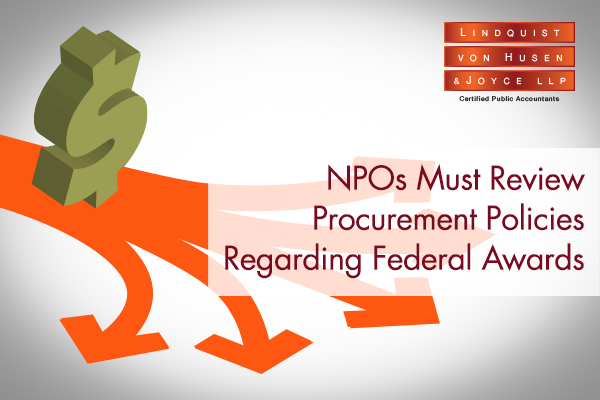
Not-for-profit organizations (NPOs) that receive federal money in the form of loans or grants will probably need to update their written procurement policies to conform to the new federal requirements. Previously only applicable to state and local governments, NPOs that receive federal awards are now included in this requirement under the new Uniform Administrative Requirements, Cost Principles, and Audit Requirements for Federal Awards (aka Uniform Guidance).
Although the Uniform Guidance became effective several years ago, the procurement changes were so complex that those regulations were repeatedly deferred to allow more time for implementation. They finally became effective in calendar year 2018 (or for fiscal years beginning in 2018). This means that the time is now to review and update NPO procurement policies.
Organizations receiving federal money will need to follow the new procurement requirements even if the amount of federal dollars received is so low that they will not need to follow the Uniform Guidance audit requirements. Federal requirements even apply to loans and grants that are received from a pass-through entity, such as another NPO, a city or a county.
The procurement standards do not apply to procurements made in indirect cost areas — just to procurements for goods and services that are directly charged to a federal award.
Under the new procurement standards, all NPOs receiving federal awards must have a written procurement policy that outlines these five allowable methods of procurement.
- Micro-purchase method – for supplies or services costing less than $10,000, no competitive quotations need to be solicited. This threshold was raised from $3,500, much to the relief of NPOs like research universities and institutes. Certain NPOs may also request an approval process for micro-purchase thresholds higher than $10,000.
- Small purchase procedures – for items costing $10,000 or more but below the simplified acquisition threshold (currently raised to $250,000): price or rate quotations must be obtained from an adequate number of qualified sources. However each NPO can determine what is an “adequate” number and it could be any number greater than one. Also, the price quotations can be in writing, oral, or by finding a price list on a website or via an online search engine. Due to the threshold increase, more procurements will likely fall under the small procurement method rather than the more stringent competitive proposal method.
- Sealed bid method – for items over the $250,000 threshold, this is the preferred method for procuring construction services. Sealed bids are publicly solicited through formal advertising and a firm fixed-price contract (lump sum or unit price) is awarded to the responsible bidder whose conforming bid is the lowest price.
- Competitive proposal method – for items over the $250,000 threshold, this more complex method involves RFPs in which qualifications of the chosen vendor are more important than the pricing of services.
- Non-competitive proposal method – for sole-source contracts, which are only feasible in certain situations, such as when a unique type of service or product can only be provided by a specific vendor or in emergency situations.
Procurement policy updates gain importance prior to and during an NPO audit, because your audit team will request copies of the NPO’s written procurement policies to ensure that they conform to the Uniform Guidance.
To support compliance, the organization should also maintain records that detail the history of procurement and methods used, including:
• The rationale for the method of procurement,
• Selection of the contract type,
• Contractor selection or rejection, and
• Basis for the contract price.
Conflict of Interest Policy Updates
As long as you are updating your procurement policies, there is also new wording required for conflict of interest policies for both employees and the organization, and which apply to all purchases. This expansion of existing language requires NPOs to have strong policies preventing organizational conflicts of interest, which will be used to protect the integrity of procurements under federal awards and subawards.
Therefore, a non-federal entity must disclose in writing any potential conflict of interest to the federal awarding agency or pass-through entity in accordance with applicable federal awarding policy.
LvHJ’s advisory team for not-for-profits can review your current procurement policy and conflict of interest policy to advise on Uniform Guidance requirements. Prepare for your next audit by contacting us now for a consultation.








